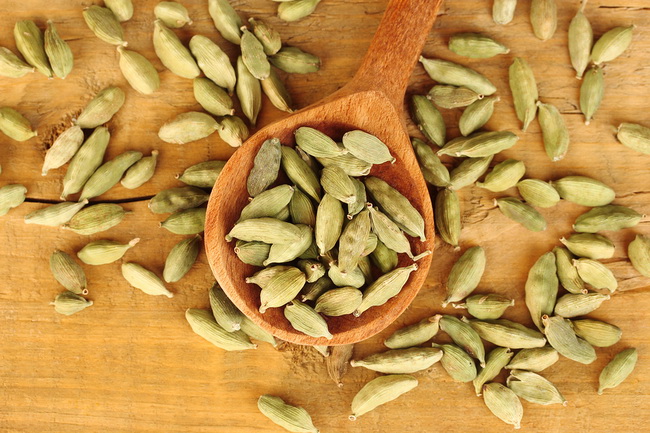- Make It Yourself Lavender Heart-Shaped Bath Bombs!
- 20 Things You Never Knew About “Down There”
- 12 Best Foods For Those Suffering From Arthritis Pain
- 12 Personal Hygiene Mistakes Almost Everyone Makes (Mom Never Told You About #4!)
- 15 Medicinal Plants And Herbs From The Cherokee People
- 12 Mind-Blowing Benefits Of Drinking Coconut Water During Pregnancy
- 12 Outstanding Winter Foods That Won’t Fatten You Up Like A Christmas Turkey
Got Stomach Aches and Pains? We Have 12 Herbal Solutions that Work!

Photo credit: bigstock.com
Is there anything more uncomfortable than nausea, indigestion, stomach pain, and bloating? Millions of people every single year have problems with stomach upset of one kind or another. Rather than reach for that pill bottle or one of those disgusting milky drinks, why not try Mother Nature’s remedies? There are literally dozens of herbs that can heal and soothe the stomach, some of them have been used for thousands of years. In fact, some studies show that many of these herbs work better than those over the counter drugs, and with few or no side effects.
Occasionally, stomach problems are a sign of something serious, so always consult your doctor prior to consuming any herbs, especially if you are taking prescription drugs. Although most herbs are known to be harmless, there are sometimes interactions with prescription drugs. As a matter of safety, always consult your physician before starting any herbal program.
Keep reading for the 12 best herbs nature has designed to calm your stomach and feel normal again!
1. Burdock Root
This is an ancient herb that stimulates the digestion by increasing the digestive acids and intestinal secretions, so if you already suffer from excess stomach acid or have ulcers, you should choose another herb. Drink burdock root tea or take a tincture about 30 minutes before each meal for best results.
2. Peppermint
Peppermint is so much more than just a breath freshener or candy flavor. Naturopathic doctors know that peppermint essential oil contains menthol, a powerful anti-spasmodic. The smell of peppermint also calms nervous stomach muscles. The Journal of Gastroenterology published a study which showed that when subjects who had irritable bowel syndrome consumed capsules of peppermint oil, they had relief of their stomach pain by as much as 40 percent and a reduction in bloating and gas by as much as 50 percent! Consume peppermint tea or capsule regularly for a super smooth functioning digestive system.
3. Fennel
In many countries, fennel is commonly served after a meal for improved digestion. Fennel is known to have a positive effect on the upper abdominal tract and has antioxidant and anti-ulcer effects. One study done in 2007 showed that fennel extracts significantly reduced gastric mucosal lesions and other types of gastric damage. Fennel has protective characteristics, which are due to its ability to increase antioxidant activities as well as reduce lipid peroxidation.
Continue to Page 2

Photo credit: bigstock.com
4. Coriander
Coriander, also known as cilantro, is the super tasty herb that is a relative of the parsley family. Coriander has powerful effects on the digestive system and can relieve bloating, gas, heartburn, nausea, and upset stomach. Coriander is also believed to promote better bowel movements. Coriander is often used in other countries, such as Germany, as a treatment for mild gastrointestinal pain, excess gas, and dyspeptic problems.
5. Lavender
You might only think lavender is a pretty scent for sachets, but lavender has potent healing compounds as well. The two main active ingredients in lavender, linalyl acetate and linalool, are what give this flowering herb its gastro protective properties. When ingested, lavender oil was found to protect the stomach from ulcers. When used in aromatherapy, lavender has been shown to have strong analgesic effects. It can also stop menstrual cramps and diarrhea.
6. Thyme
This delicate herb can help relieve gas, stomach pains, gastritis, and upset stomachs with ease. It is also known to promote improved digestion. Consumed regularly, thyme can help reduce irritable bowel syndrome symptoms and colic. Thyme relaxes the stomach muscles, which helps to stop problems such as chronic gastritis and indigestion. Thyme also has beneficial nutrients such as chromium, calcium, iron, and vitamin K.
Continue to Page 3

Photo credit: bigstock.com
7. Rosemary
This super fragrant herb is the perfect all around herb for improving digestion and stopping stomach pain. It stimulates the production of bile and detoxifies the liver. Rosemary can also enhance the appetite and relive common problems such as bloating, gas, stomach cramp, and constipation. It does this by relaxing the muscles of the digestive tract, which will relieve most common stomach discomfort complaints.
8. Chamomile
One of the gentlest and safest herbs known to man, chamomile has strong anti-inflammatory, calming, and anti-spasmodic compounds that fight many gastrointestinal issues. Its sedative properties soothe the mucous lining of the digestive system to relieve gas, heartburn, indigestion, and other types of stomach problems, especially when due to anxiety or nervousness. Research has shown that taking oral extracts of chamomile had a gastro protective effect against ulcers.
9. Dandelion
Dandelion is often thought of as nothing more than a common weed, but it actually is a treasure chest of valuable health nutrients. Dandelion contains zinc, iron, protein, riboflavin, ascorbic acid, manganese, B-vitamins, and flavonoids. This plant has strong blood purifying and liver cleansing effects. Dandelion is a known diuretic and can help promote better digestion as well as helping to cleanse the lymph system. This herb can also help those who suffer with diarrhea after eating. Dandelion tea is a terrific way to end a meal and encourage healthy digestion. The leaves of this plant will increase stomach acid and strengthen the liver, stomach, and gallbladder functions. By relieving intestinal gas and upset stomach, dandelion is a wonderful all around stomach tonic that is well tolerated by almost everyone.
Continue to Page 4

Photo credit: bigstock.com
10. Cardamom
You will often find this spice in Asian and Indian food. Cardamom has analgesic and anti-spasmodic compounds, which makes it a very effective remedy for many stomach conditions. The volatile oils in cardamom are thought to be super beneficial when it comes to soothing and calming the stomach and intestines. Cardamom is well-known for reliving dysentery, indigestion, constipation, upset stomachs, and other types of digestive problems.
11. Ginger
Ginger is a rather unique herb as its root is able to stop nausea and vomiting like nothing else. Herbalists everywhere agree that freshly grated, organic ginger is the best remedy for stopping morning sickness, motion sickness, and other types of nausea and vomiting issues without causing drowsiness. Ginger is also excellent for stopping the pain associated with gas and bloating. One study conducted in 2014 found that ginger offered strong protection from ulcers. Drinking a cup of ginger tea either before or after meals will go a long way towards improving the digestion.
SEE ALSO: Potato Juice Helps Stomach Problems
12. Cinnamon
This popular and super tasty spice is known to stimulate digestion and stop stomach cramps. Taken as a tea, cinnamon can help calm most stomach problems with just one cup.
Sometimes, choosing the best herbal remedy comes down to what your stomach will tolerate or what your tastes are. When you are struggling with nausea or vomiting, if you can’t keep one herb down, try another one. If you really dislike the taste or smell of one herb, try something else! Many of the above herbs are available either as teas or in supplement form.
References:
































